Papers by Odeh Ibn Iganga
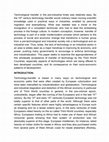
Technological transfer in the pre-industrial times was relatively easy. By the 19th century techn... more Technological transfer in the pre-industrial times was relatively easy. By the 19th century technology transfer would ordinary mean moving scientific knowledge used in practical ways in industries, enabled by personal migration and exemplifying. What was needed was a travel or the immigration of a competent technician who had to lead the embedding process in the foreign culture. In modern conception, however, transfer of technology is part of a wider modernization process which pertains to the process of social and economic change that transforms a human group from a pre-technological and industrial society into a technological and an industrial one. Thus, today, the lack of technology or an industrial sector in an area is widely seen as a major handicap in improving its economy, and power, pushing many governments to encourage or enforce technology and industrialization. This paper seeks to examine the appropriateness of this wholesale acceptance of transfer of technology by the Third World Countries, especially aspects of technologies which are being offered to less developed countries, and its consequence on their socio-economic patterns of development.
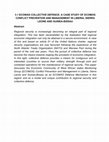
Regional security is increasingly becoming an integral part of regional integration. This has bee... more Regional security is increasingly becoming an integral part of regional integration. This has been necessitated by the realization that regional economic integration can only be attained in a secure environment. In view of this and based on article 51 of the United Nations charter, regional security organizations are now favoured following the experience of the North Atlantic Treaty Organization (NATO) and Warsaw Pact during the period of the cold war years. Thus the pursuit of collective defence has become the means towards reaping the proceeds of economic integration. In this light, collective defence provides a means for contiguous and or interested countries to source their military strength through joint and combined operations for the maintenance of regional security. This paper discusses the Economic Community of West African states Monitoring Group (ECOMOG) Conflict Prevention and Management in Liberia, Sierra Leone and Guinea-Bissau as an ECOWAS Defence Mechanism in this regard, and as a model and unique contribution to regional security and collective defence.
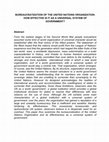
From the earliest stages of the Second World War people everywhere assumed some kind of world org... more From the earliest stages of the Second World War people everywhere assumed some kind of world organization of universal character would be established after the final victory of the Allied powers. The statesmen of the West hoped that the nations would profit from the League of Nations’ experience and that the generation which had reaped the bitter fruits of the two world wars, a worldwide depression, mass extermination on a scale unprecedented in history, and threats to human freedom everywhere would be more earnestly committed than ever before to the building of a stronger and more equitable international order in which a new world organization, sort of a world government, with a universal system of government would play a central role. That organization, which emerged, of course, was the United Nations. By its structure, organization and goals, the United Nations seems the closest caricature to a world government that ever existed, notwithstanding that its members are made up of sovereign states that are unwilling to surrender their sovereignty to the United Nations. However its designed acknowledges the realities of international anarchy and accommodates this unwillingness of states to surrender their sovereignties. Given these limitations, observers view the UN as a world ‘government’, a global institution which provides a global institutional structure for states to resolve their differences with less reliance on the use of force. Although the UN exhibits some main characteristics of a global institution with a universal system of government, over the years, the organization has gained a reputation of a large and unwieldy bureaucracy that is inefficient and wasteful, thereby hindering its effectiveness. This excessively bureaucratic and dysfunctional UN system, observers believe is in desperate need for an overhaul. This paper thus examines the bureaucratization of the United Nations Organization and its effectiveness as a universal system of government.
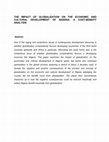
One of the raging and contentious issues in contemporary development discourse is whether globali... more One of the raging and contentious issues in contemporary development discourse is whether globalization comparatively favours developing economies of the third world countries generally and Africa in particular. Narrowing the issue home also is the contentious issue of whether globalization comparatively favours a developing economy like Nigeria. This paper examines the impact of globalization on the economies and cultural development of Nigeria (given her active and continued participation in the global process spanning a period of about 3 decades now). It reveals the negative and positive consequences of the process and concept of globalization on the economic and cultural development of Nigeria adjudging the country did not benefit much from globalization. The paper then recommends measures as to how the negative consequences could be reduced drastically and makes Nigeria benefit maximally from globalization.
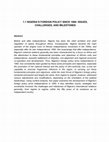
Before and after independence, Nigeria has been the chief architect and chief negotiator of peace... more Before and after independence, Nigeria has been the chief architect and chief negotiator of peace throughout Africa. Consequently, Nigeria became the main operator of the engine room of African independence movement in the 1950s, and especially after its own independence 1960. Not surprisingly that after independence, Nigeria’s external relations generally has been characterized by a focus on Africa and the attachment to these fundamental principles and objectives of African unity and independence, peaceful settlement of disputes, non-alignment and regional economic co-operation and development. Thus, Nigeria’s foreign policy since independence in 1960, has consistently been guided by these same principles and objectives, especially the promotion of her national interest and the policy of afro-centricity vise- a-vise her capability to exercise hegemonic influence in the region. In carrying out these fundamental principles and objectives, while the main thrust of Nigeria’s foreign policy remained permanent and largely the same, from regime to regime, however, witnessed various adjustments and modifications, depending on the orientation of the political leaderships. Using content analysis, this paper examines the development of Nigeria’s foreign policy since independence in 1960. It also identifies issues, strategies and constraints involved; the challenges and milestones of Nigeria’s international relations generally, from regime to regime, within the fifty years of its existence as an independent country.

The book focuses on critical and pertinent issues concerning the development of Igedeland. It exa... more The book focuses on critical and pertinent issues concerning the development of Igedeland. It examines specifically areas such as political leadership, education, the role of women, Igede identity and marginalization, industrialization through iron- smelting and other technologies as would be enhanced by the various mineral deposits in the area, and socio-economic development among others. As a festschrift in honour of Chief Reuben Galba Ade (JP) on his 70th Birthday Anniversary Celebration, the book not only examines his proactive contributions to the development of Igede society, Benue state and the nation but critically discuss the roles the various groups of people play to promote Igede development. It also examines the various other roles individuals or groups played to perpetuate the under-development of Igede society. The contributors of this volume try to proffer solutions to resolve the development quagmire of the people by those that have access to national wealth and power.

It is on record that Ogbuloko Ukpata Ogoji has been declared as one of the country’s heroes by th... more It is on record that Ogbuloko Ukpata Ogoji has been declared as one of the country’s heroes by the relevant agencies of the Federal Government of Nigeria. By this, it means his effort in moblising his people, the Igede, to resist the imposition of colonial rule in this part of North Central Nigeria, is recognised nationally and therefore one of the fore-fathers of secondary resistance in Nigeria. Yet, no documented study of this military master-mind and great nationalist or even his people, the Igede imbued with a passion for preserving their traditional political system and culture as well as their independence and “probably the most difficult people militarily in the Northern Province” exists.
Seen through the lenses of colonial officers’ reports, anthropological records and even in the estimation of some older historians, the Ogbuloko resistance movement was entirely one of lawlessness and banditry which falls within the category of “a local satrap to be lamented as Negro Myth or the Ordeal of the Black Man”, and without any organisation, noble purpose or positive significance for the people of the area.
This book which focuses on the origins, purpose, organisation, course and reasons for the eventual failure of the rebellion, hopes to be a start in fully scrutinising this significant episode in the history of colonial Igede within a Pan-African framework. It draws as complete and as concise as possible a picture of an area that has been almost totally neglected and an event equally ignored. It emphasise the fact that the Igede resistance in this regard, is not merely a secondary resistance as else where in Africa, but a testimony to the inconclusiveness of the British conquest of the Northern Province
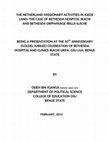
The religious and moral awakening which produced the ant-slave trade movement in Europe and Ameri... more The religious and moral awakening which produced the ant-slave trade movement in Europe and America gave rise to a strong and active desire to spread the gospel to non-Christian communities of Asia and Africa in the late 18th and early 19th centuries. These societies sent out missionaries to Africa and other parts of the world. In England, the Baptist Missionary Society was founded in 1798; the London Missionary Society in 1797; the British and Foreign Bible Society in 1803; the University Mission to Central Africa in 1857; and the Society for African Mission in 1858 (Onwubiko, 1986).
Historians have generally given reasons for the motives of these missionary enterprises in Africa at the time. These reasons and motives range from the wish to save the souls of African rescued from slavery by converting them to Christian faith, the desire to halt the spread of Islam which at the time was making tremendous headway towards the South, and the need to purge European Christian conscience which had been stung by the Whiteman’s role in the slave trade and thereby atone for Europe’s crime against Africa. Other reasons given, range from the humanitarian consideration, to economic motives and political considerations (Ajayi, 1962). Although detail analyses of these arguments are beyond the scope of this paper, what generally can be pointed out as Ajayi and Espie (1965:62) rightly observed is that, “European interest began with the establishment of Christian missions. Trade followed missionaries. The missionaries led traders in calling for European intervention in Africa”.
The above conception is largely true of the situation before the conquest, occupation and colonization of the various parts of Africa. In Igede, however, the aftermath of the Ogbuloko resistance movement in 1928 saw the British in effect turning their back on Igede land. Consequently, they explored various means of keeping the subjugated ‘pacified’. These included a haphazard reorganization of the administrative system in the area and the introduction of Christianity to Igede land. Part of the reorganization exercise, also, was the establishment of three Methodist Schools in Igede, first in Ibilla in 1932, and in Ito and Ainu in 1935. As with the neighbouringTiv, the British saw the spread of Christianity as one potential means of “taming the ferocious” Igede people to fall in line. Christian resignation, after all, would mean resignation to British rule as well. (Iganga, 2008) Thus in Igede land (as with other parts of Africa then), after the decolonization exercise, beginning from the 1960s, the relatively successful religious and missionary enterprise not bereft of genuine moral and humanitarian re-awakening began in earnest.
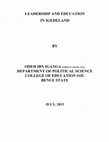
The search for the characteristics or traits of leadership has been on-going for centuries. Histo... more The search for the characteristics or traits of leadership has been on-going for centuries. History’s greatest philosophical writings from Plato’s Republic to Plutarch’s Lives have explored the question “what qualities distinguish an individual as a leader?” Underlying
this search however, was the early recognition of the essence of education to leadership and the assumption that leadership is rooted in the characteristics that certain individuals possess. Education, knowledge and skills contribute directly to the process of leadership, while other attributes give the leader certain characteristics that can make him or her unique. These very essences of leadership which are lacking in Igede society provide an insight into the problem of leadership in Igedeland. Given the largely contrived disadvantage of Igede nation as an ethnic minority eclipsed by larger ethnic groups in Nigerian and Benue in particular, the alternative is a visionary leadership imbued with the highly cherished value of education. In this paper, we explore the interlinking leadership and education discourses. The paper examines the interface between education and leadership as the bedrock of the development of Igede society, and as a vital tool for the rectification of anomalies, equalization of opportunities and for empowerment that allows meaningful contributions and development of Igedeland.
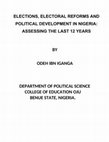
In the contemporary world of today, elections have become the most accepted means of changing lea... more In the contemporary world of today, elections have become the most accepted means of changing leadership in any given political system. Election ordinarily, in most democratic states is usually conducted by an institution set up by law in any given society. The principal mechanism for translating the consent of the governed into governmental authority is the holding of free and fair election. History has shown that it is usually difficult to hold elections that are completely free and fair. Even the United States (US) election that led to the victory of President Bush was alleged to be marred with irregularities in the State of Florida. Studies of elections have revealed that transiting from one regime to another is often the problem in most African states. For instance, the recent elections in Kenya were reported to be seriously flawed and impacted by irregularities in vote tabulation and reporting of results just like the election debacle in Cote d’Ivoire between Laurent Gbagbo and Alassane Quattarra to mention just a few. In Nigeria, the 1999, 2003 and 2007 Presidential elections were reported to be marred by irregularities by foreign and local observers. Against these backdrop is the general consensus among scholars, political activists, and well-meaning Nigerians of the need for electoral reforms. This paper examines elections, electoral reforms and political development in Nigeria within the last 12 years. It reveals how since independence, the various phases of Nigeria’s democracy has been shrouded with electoral credibility and regime legitimacy questions, and highlighting specifically the challenges and opportunities for electoral reforms in Nigeria. The paper proffers measures as the way forward and ended with a conclusion.
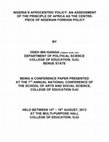
Diplomacy is generally equated with the business of handling a porcupine without disturbing the q... more Diplomacy is generally equated with the business of handling a porcupine without disturbing the quills. All war represents a failure of diplomacy. Foreign policy, like diplomacy, is a disguised war, in which states and non-state actors seek to gain by barter, diplomacy and intrigues, by the cleverness of arts, the objectives which they would have to gain more clumsily by means of war. In the advanced democracies, diplomacy is used as a handmaiden of foreign policy. Thus while foreign policy of a state is said to be the substance of foreign relations, diplomacy is the process by which foreign policy is carried out. Nation-states and even continents of the world do not exist in complete isolation from each other. The nation-states which are the main units of continents have to carry on some of their activities in the world environment. Thus they do not only come into contact with each other on their continent, but they also interact with nation-states in other continents. This worldwide interaction takes place in what is called international system. For this interaction to be realized, states are the key actors in this worldwide relation. There is the need for nation-states to conduct their policies diplomatically in order to avoid conflict and absorb those other actors provided they do not jeopardize their own interest. This idea of live and let’s live which involves the formulation, marketing and pursuit of policies by states in the international arena brings about foreign policy. Generally, therefore, the concept of foreign policy suggests the right of a particular sovereign nation-state to deal and conduct foreign affairs relations with foreign powers. And usually, the actions a country takes in its relationship with other countries in the international system are motivated and moderated by certain compelling variables which are inextricably linked and inevitably influenced by the domestic situation. This paper therefore examines Nigeria’s Afro-centric Policy as a major determinant of Nigerian foreign policy with a view to refocusing our foreign policy thrust, and attaching more premiums to our sense of national interest and pride which must necessarily anchor towards socio-economic development of the nation and the upliftment of the citizen’s standard of living.

The Igede people in Benue State, Central Nigeria, are the third largest ethnic group in the state... more The Igede people in Benue State, Central Nigeria, are the third largest ethnic group in the state after the Tiv and Idoma, yet they are a largely unreported people. Except for some recent articles, the exposition of their history has mainly been based on anthropological studies and published accounts of colonial administrators which discussed events in the area largely from the purview of European notions of “stateless pagans without a pre-colonial history and an evolving state system”.
The book attempts to redress these limitations and highlight major historical developments in pre and colonial Igede society. It seeks to accomplish a history of the Igede people that necessarily deviates from the former tradition and conventional general histories of the past to the extent that a primarily interpretive focus governs the inclusion of narrative materials. It draws upon the central original sources of Igede history and supplements it with an extensive effort to cull out that, which sounds, and translatable into broad public terms from the extra-ordinary dearth of significant historical materials that has been the lot in this part of Nigeria. The book draws a complete and concise picture of an area that has been almost totally neglected and events and issues equally ignored in history writing. Finally, it shows how a relatively self-sufficient and autonomous traditional society reacted to the shocks of the imposition of colonial rule.









Uploads
Papers by Odeh Ibn Iganga
Seen through the lenses of colonial officers’ reports, anthropological records and even in the estimation of some older historians, the Ogbuloko resistance movement was entirely one of lawlessness and banditry which falls within the category of “a local satrap to be lamented as Negro Myth or the Ordeal of the Black Man”, and without any organisation, noble purpose or positive significance for the people of the area.
This book which focuses on the origins, purpose, organisation, course and reasons for the eventual failure of the rebellion, hopes to be a start in fully scrutinising this significant episode in the history of colonial Igede within a Pan-African framework. It draws as complete and as concise as possible a picture of an area that has been almost totally neglected and an event equally ignored. It emphasise the fact that the Igede resistance in this regard, is not merely a secondary resistance as else where in Africa, but a testimony to the inconclusiveness of the British conquest of the Northern Province
Historians have generally given reasons for the motives of these missionary enterprises in Africa at the time. These reasons and motives range from the wish to save the souls of African rescued from slavery by converting them to Christian faith, the desire to halt the spread of Islam which at the time was making tremendous headway towards the South, and the need to purge European Christian conscience which had been stung by the Whiteman’s role in the slave trade and thereby atone for Europe’s crime against Africa. Other reasons given, range from the humanitarian consideration, to economic motives and political considerations (Ajayi, 1962). Although detail analyses of these arguments are beyond the scope of this paper, what generally can be pointed out as Ajayi and Espie (1965:62) rightly observed is that, “European interest began with the establishment of Christian missions. Trade followed missionaries. The missionaries led traders in calling for European intervention in Africa”.
The above conception is largely true of the situation before the conquest, occupation and colonization of the various parts of Africa. In Igede, however, the aftermath of the Ogbuloko resistance movement in 1928 saw the British in effect turning their back on Igede land. Consequently, they explored various means of keeping the subjugated ‘pacified’. These included a haphazard reorganization of the administrative system in the area and the introduction of Christianity to Igede land. Part of the reorganization exercise, also, was the establishment of three Methodist Schools in Igede, first in Ibilla in 1932, and in Ito and Ainu in 1935. As with the neighbouringTiv, the British saw the spread of Christianity as one potential means of “taming the ferocious” Igede people to fall in line. Christian resignation, after all, would mean resignation to British rule as well. (Iganga, 2008) Thus in Igede land (as with other parts of Africa then), after the decolonization exercise, beginning from the 1960s, the relatively successful religious and missionary enterprise not bereft of genuine moral and humanitarian re-awakening began in earnest.
this search however, was the early recognition of the essence of education to leadership and the assumption that leadership is rooted in the characteristics that certain individuals possess. Education, knowledge and skills contribute directly to the process of leadership, while other attributes give the leader certain characteristics that can make him or her unique. These very essences of leadership which are lacking in Igede society provide an insight into the problem of leadership in Igedeland. Given the largely contrived disadvantage of Igede nation as an ethnic minority eclipsed by larger ethnic groups in Nigerian and Benue in particular, the alternative is a visionary leadership imbued with the highly cherished value of education. In this paper, we explore the interlinking leadership and education discourses. The paper examines the interface between education and leadership as the bedrock of the development of Igede society, and as a vital tool for the rectification of anomalies, equalization of opportunities and for empowerment that allows meaningful contributions and development of Igedeland.
The book attempts to redress these limitations and highlight major historical developments in pre and colonial Igede society. It seeks to accomplish a history of the Igede people that necessarily deviates from the former tradition and conventional general histories of the past to the extent that a primarily interpretive focus governs the inclusion of narrative materials. It draws upon the central original sources of Igede history and supplements it with an extensive effort to cull out that, which sounds, and translatable into broad public terms from the extra-ordinary dearth of significant historical materials that has been the lot in this part of Nigeria. The book draws a complete and concise picture of an area that has been almost totally neglected and events and issues equally ignored in history writing. Finally, it shows how a relatively self-sufficient and autonomous traditional society reacted to the shocks of the imposition of colonial rule.
Seen through the lenses of colonial officers’ reports, anthropological records and even in the estimation of some older historians, the Ogbuloko resistance movement was entirely one of lawlessness and banditry which falls within the category of “a local satrap to be lamented as Negro Myth or the Ordeal of the Black Man”, and without any organisation, noble purpose or positive significance for the people of the area.
This book which focuses on the origins, purpose, organisation, course and reasons for the eventual failure of the rebellion, hopes to be a start in fully scrutinising this significant episode in the history of colonial Igede within a Pan-African framework. It draws as complete and as concise as possible a picture of an area that has been almost totally neglected and an event equally ignored. It emphasise the fact that the Igede resistance in this regard, is not merely a secondary resistance as else where in Africa, but a testimony to the inconclusiveness of the British conquest of the Northern Province
Historians have generally given reasons for the motives of these missionary enterprises in Africa at the time. These reasons and motives range from the wish to save the souls of African rescued from slavery by converting them to Christian faith, the desire to halt the spread of Islam which at the time was making tremendous headway towards the South, and the need to purge European Christian conscience which had been stung by the Whiteman’s role in the slave trade and thereby atone for Europe’s crime against Africa. Other reasons given, range from the humanitarian consideration, to economic motives and political considerations (Ajayi, 1962). Although detail analyses of these arguments are beyond the scope of this paper, what generally can be pointed out as Ajayi and Espie (1965:62) rightly observed is that, “European interest began with the establishment of Christian missions. Trade followed missionaries. The missionaries led traders in calling for European intervention in Africa”.
The above conception is largely true of the situation before the conquest, occupation and colonization of the various parts of Africa. In Igede, however, the aftermath of the Ogbuloko resistance movement in 1928 saw the British in effect turning their back on Igede land. Consequently, they explored various means of keeping the subjugated ‘pacified’. These included a haphazard reorganization of the administrative system in the area and the introduction of Christianity to Igede land. Part of the reorganization exercise, also, was the establishment of three Methodist Schools in Igede, first in Ibilla in 1932, and in Ito and Ainu in 1935. As with the neighbouringTiv, the British saw the spread of Christianity as one potential means of “taming the ferocious” Igede people to fall in line. Christian resignation, after all, would mean resignation to British rule as well. (Iganga, 2008) Thus in Igede land (as with other parts of Africa then), after the decolonization exercise, beginning from the 1960s, the relatively successful religious and missionary enterprise not bereft of genuine moral and humanitarian re-awakening began in earnest.
this search however, was the early recognition of the essence of education to leadership and the assumption that leadership is rooted in the characteristics that certain individuals possess. Education, knowledge and skills contribute directly to the process of leadership, while other attributes give the leader certain characteristics that can make him or her unique. These very essences of leadership which are lacking in Igede society provide an insight into the problem of leadership in Igedeland. Given the largely contrived disadvantage of Igede nation as an ethnic minority eclipsed by larger ethnic groups in Nigerian and Benue in particular, the alternative is a visionary leadership imbued with the highly cherished value of education. In this paper, we explore the interlinking leadership and education discourses. The paper examines the interface between education and leadership as the bedrock of the development of Igede society, and as a vital tool for the rectification of anomalies, equalization of opportunities and for empowerment that allows meaningful contributions and development of Igedeland.
The book attempts to redress these limitations and highlight major historical developments in pre and colonial Igede society. It seeks to accomplish a history of the Igede people that necessarily deviates from the former tradition and conventional general histories of the past to the extent that a primarily interpretive focus governs the inclusion of narrative materials. It draws upon the central original sources of Igede history and supplements it with an extensive effort to cull out that, which sounds, and translatable into broad public terms from the extra-ordinary dearth of significant historical materials that has been the lot in this part of Nigeria. The book draws a complete and concise picture of an area that has been almost totally neglected and events and issues equally ignored in history writing. Finally, it shows how a relatively self-sufficient and autonomous traditional society reacted to the shocks of the imposition of colonial rule.